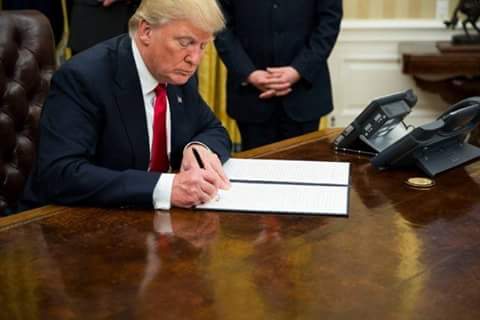US President Donald Trump will present today his plan to combat an opioid abuse epidemic which will include seeking the death penalty for drug traffickers.
The Department of Justice “will seek the death penalty against drug traffickers, where appropriate under current law,” a White House official indicated Sunday whilst outlining the plan’s main points.
The official did not offer greater detail on how the death penalty could be invoked against drug dealers without amending statutes.
Trump is due to unveil his plan in a speech in Manchester, New Hampshire, a state hard hit by the crisis.
An estimated 2.4 million Americans are addicted to opiates, the narcotics that include prescription painkillers, as well as heroin.
Nationwide, emergency room visits for overdoses from drugs like heroin, fentanyl and prescription painkillers up 30 percent from 2016 to 2017, the Centers for Disease Control and Prevention said earlier this month.
The report found that from July 2016 to September 2017, a total of 142,557 emergency room visits were due to suspected opioid overdoses.
Trump has previously mooted the “ultimate” punishment for drug dealers, and is said to have spoken in glowing terms about the policies of deeply controversial Filipino leader Rodrigo Duterte, who has ordered extra-judicial killings of traffickers.
“If you shoot one person, they give you life, they give you the death penalty. These people [who sell drugs] can kill 2,000, 3,000 people and nothing happens to them,” he said.
Many opposition Democrats oppose the idea of executing drug dealers, and changing the law would require an act of Congress.
“We will not incarcerate or execute our way out of the opioid epidemic,” said Democratic senator Ed Markey last week.
“Extreme proposals like using the death penalty only perpetuate a harmful stigma associated with opioid use disorders and divert attention from meaningful conversations and progress on expanding access to treatment, recovery, and other public health initiatives,” he said.

 Health5 days ago
Health5 days ago
 Entertainment7 days ago
Entertainment7 days ago
 Crime6 days ago
Crime6 days ago
 Education1 week ago
Education1 week ago
 Health1 week ago
Health1 week ago
 Comments and Issues6 days ago
Comments and Issues6 days ago
 Football7 days ago
Football7 days ago
 Latest6 days ago
Latest6 days ago




